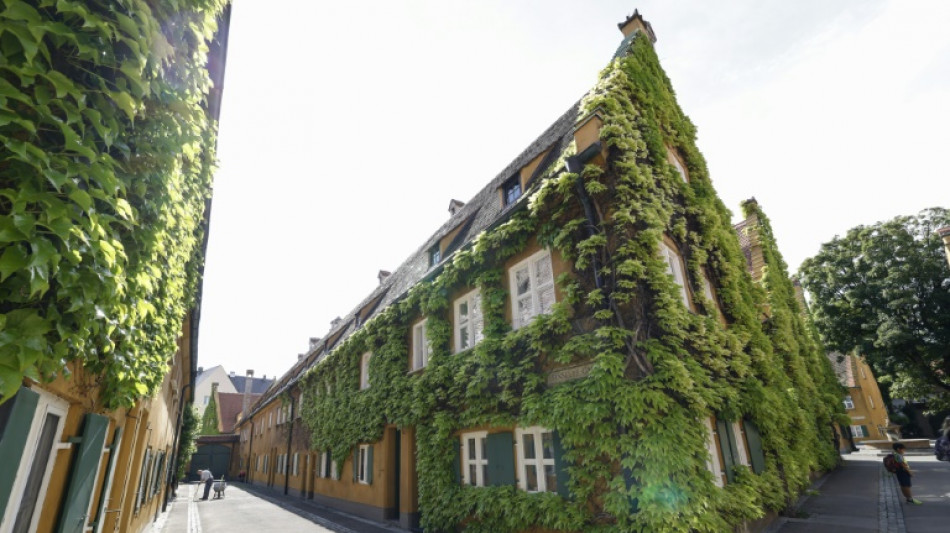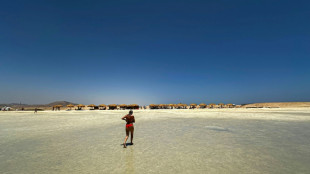
-
 'Things will improve': Bolivians look forward to right's return
'Things will improve': Bolivians look forward to right's return
-
Trump welcomes Zelensky with fresh optimism on peace deal

-
 Israeli controls choke Gaza relief at Egypt border, say aid workers
Israeli controls choke Gaza relief at Egypt border, say aid workers
-
Air Canada flight attendants vow to defy latest back-to-work order

-
 Hurricane Erin drenches Caribbean islands, threatens US coast
Hurricane Erin drenches Caribbean islands, threatens US coast
-
Europeans arrive for high-stakes Trump and Zelensky talks

-
 Trump, Zelensky and Europeans meet in bid to resolve split over Russia
Trump, Zelensky and Europeans meet in bid to resolve split over Russia
-
Hamas accepts new Gaza truce plan: Hamas official

-
 Stocks under pressure ahead of Zelensky-Trump talks
Stocks under pressure ahead of Zelensky-Trump talks
-
Russian attacks kill 14 in Ukraine ahead of Trump-Zelensky talks

-
 Lassana Diarra seeks 65 mn euros from FIFA and Belgian FA in transfer case
Lassana Diarra seeks 65 mn euros from FIFA and Belgian FA in transfer case
-
Air Canada flight attendants face new pressure to end strike

-
 Alonso says 'no excuses' as Real Madrid prepare for La Liga opener
Alonso says 'no excuses' as Real Madrid prepare for La Liga opener
-
Deadly wildfires rage across Spain as record area of land burnt

-
 Swedish ex-govt adviser goes on trial over mislaid documents
Swedish ex-govt adviser goes on trial over mislaid documents
-
Injured Springboks captain Kolisi out for four weeks

-
 Irish literary star Sally Rooney pledges UK TV fees to banned pro-Palestine group
Irish literary star Sally Rooney pledges UK TV fees to banned pro-Palestine group
-
Stocks mixed ahead of Trump-Zelensky talks

-
 Son of Norway princess charged with four rapes
Son of Norway princess charged with four rapes
-
Fresh Pakistan monsoon rains kill 20, halt rescue efforts

-
 Forest sign French forward Kalimuendo
Forest sign French forward Kalimuendo
-
Zelensky warns against 'rewarding' Russia after Trump urges concessions

-
 FIFA boss condemns racial abuse in German Cup games
FIFA boss condemns racial abuse in German Cup games
-
Stocks diverge ahead of Trump-Zelensky talks

-
 Spain and Portugal battle wildfires as death toll mounts
Spain and Portugal battle wildfires as death toll mounts
-
Joao Felix says late Jota 'will forever be part of football history'

-
 Javelin star Kitaguchi finds new home in small Czech town
Javelin star Kitaguchi finds new home in small Czech town
-
Rain halts rescue operation after Pakistan floods kill hundreds

-
 Zelensky says Russia must end war, after Trump pressures Ukraine
Zelensky says Russia must end war, after Trump pressures Ukraine
-
China slams Germany for 'hyping' regional tensions in Asia

-
 US envoy says Israel's turn to 'comply' as Lebanon moves to disarm Hezbollah
US envoy says Israel's turn to 'comply' as Lebanon moves to disarm Hezbollah
-
Asia stocks up before Trump-Zelensky talks

-
 Fight to save last forests of the Comoros unites farmers, NGOs
Fight to save last forests of the Comoros unites farmers, NGOs
-
Hong Kong court hears closing arguments in tycoon Jimmy Lai's trial

-
 Five killed in Russian drone attack on Ukraine apartment block
Five killed in Russian drone attack on Ukraine apartment block
-
Myanmar junta sets December 28 poll date despite raging civil war

-
 German minister says China 'increasingly aggressive'
German minister says China 'increasingly aggressive'
-
Singapore key exports slip in July as US shipments tumble 42.7 pct

-
 German great Mueller has goal ruled out on MLS debut for Vancouver
German great Mueller has goal ruled out on MLS debut for Vancouver
-
Zelensky, European leaders head to US for talks on peace deal terms

-
 Tourism deal puts one of Egypt's last wild shores at risk
Tourism deal puts one of Egypt's last wild shores at risk
-
Two right-wing candidates headed to Bolivia presidential run-off

-
 Australian court fines Qantas US$59 million for illegal layoffs
Australian court fines Qantas US$59 million for illegal layoffs
-
Games industry in search of new winning combo at Gamescom 2025

-
 Rooms of their own: women-only communities thrive in China
Rooms of their own: women-only communities thrive in China
-
Social media hit Ilona Maher takes women's rugby onto new plane

-
 Asia stocks up, oil down before Trump-Zelensky talks
Asia stocks up, oil down before Trump-Zelensky talks
-
Zelensky returns to site of stunning Oval Office shouting match

-
 Two right-wing candidates headed to Bolivia presidential run-off: projection
Two right-wing candidates headed to Bolivia presidential run-off: projection
-
Valsoft Corporation Acquires Three SaaS Companies from SOVRA: Carrus, Polygon, and The Broker Forum

| RYCEF | 1.35% | 14.8 | $ | |
| CMSC | 0.09% | 23.14 | $ | |
| RBGPF | 3.84% | 76 | $ | |
| CMSD | 0.43% | 23.44 | $ | |
| NGG | -1.03% | 70.7 | $ | |
| VOD | 0.47% | 11.725 | $ | |
| BCC | -1.48% | 84.735 | $ | |
| SCS | -0.72% | 16.035 | $ | |
| GSK | -0.54% | 39.15 | $ | |
| RIO | -1.54% | 60.31 | $ | |
| AZN | 0.23% | 79.35 | $ | |
| RELX | -0.3% | 47.815 | $ | |
| JRI | -0.3% | 13.32 | $ | |
| BCE | -0.12% | 25.58 | $ | |
| BTI | 1.25% | 57.875 | $ | |
| BP | -1.1% | 33.955 | $ |

Middle Age rents live on in German social housing legacy
When German pensioner Angelika Stibi got the keys to her new home in the southern region of Bavaria this year, a huge financial weight was lifted from her shoulders.
Stibi has to pay just 88 euro cents ($1.01) a year for her apartment in the social housing complex known as the Fuggerei, where rents have not gone up since the Middle Ages.
Founded in 1521 by the wealthy businessman Jakob Fugger and believed to be the oldest such project in the world, the Fuggerei in the city of Augsburg provides living space for 150 residents facing financial hardship.
Consisting of several rows of yellow terraced buildings with green shutters and sloping red roofs, the complex still resembles a medieval village.
"I had a truly wonderful life until I was 55," said Stibi, a mother of two in her 60s from Augsburg.
After she was diagnosed with cancer, "everything went from bad to worse" and she was left with no other option but to apply for social housing, she said.
Waiting lists are long for apartments in the walled enclave not far from Augsburg city centre, with most applicants having to wait "between two and six or seven years", according to resident social worker Doris Herzog.
"It all depends on the apartment you want. The ones on the ground floor are very popular," Herzog said.
Applicants must be able to prove that they are Augsburg residents, Catholic and suffering from financial hardship.
- Relative of Mozart -
Martha Jesse has been living at the Fuggerei for 17 years after finding herself with monthly pension payments of just 400 euros, despite having worked for 45 years.
"Living elsewhere would have been almost impossible," said the 77-year-old, whose apartment is filled with religious symbols.
The Fuggerei was heavily damaged in World War II but has since been rebuilt in its original style.
Renowned composer Wolfgang Amadeus Mozart's great-grandfather, the mason Franz Mozart, was once a resident and visitors can still see a stone plaque bearing his name.
For Andreas Tervooren, a 49-year-old night security guard who has lived at the Fuggerei since 2017, the complex is "like a town within a town" or "the Asterix village in the comic books".
The meagre rents at the Fuggerei are all the more remarkable given its location an hour's drive from Munich, the most expensive city in Germany to live in and one of the most expensive in Europe.
Rents have also risen sharply in many other German cities in recent years, leading to a wave of protests.
- Daily prayer -
But not at the Fuggerei, whose founders stipulated that the rent should never be raised.
Jakob Fugger (1459-1525), also known as Jakob the Rich, was a merchant and financier from a wealthy family known for its ties to European emperors and the Habsburg family.
Fugger set up several foundations to help the people of Augsburg, and they continue to fund the upkeep of the Fuggerei to this day.
The annual rent in the Fuggerei was one Rhenish gulden, about the weekly wage of a craftsman at the time -- equivalent to 88 cents in today's money.
Although some descendants of the Fugger family are still involved in the management of the foundations, they no longer contribute any money.
"We are financed mainly through income from forestry holdings, and we also have a small tourism business," said Daniel Hobohm, administrator of the Fugger foundations.
The Fuggerei attracts a steady stream of visitors, and the foundations also receive rental income from other properties.
In return for their lodgings, residents of the Fuggerei must fulfil just one condition -- every day, they must recite a prayer for the donors and their families.
S.Gregor--AMWN